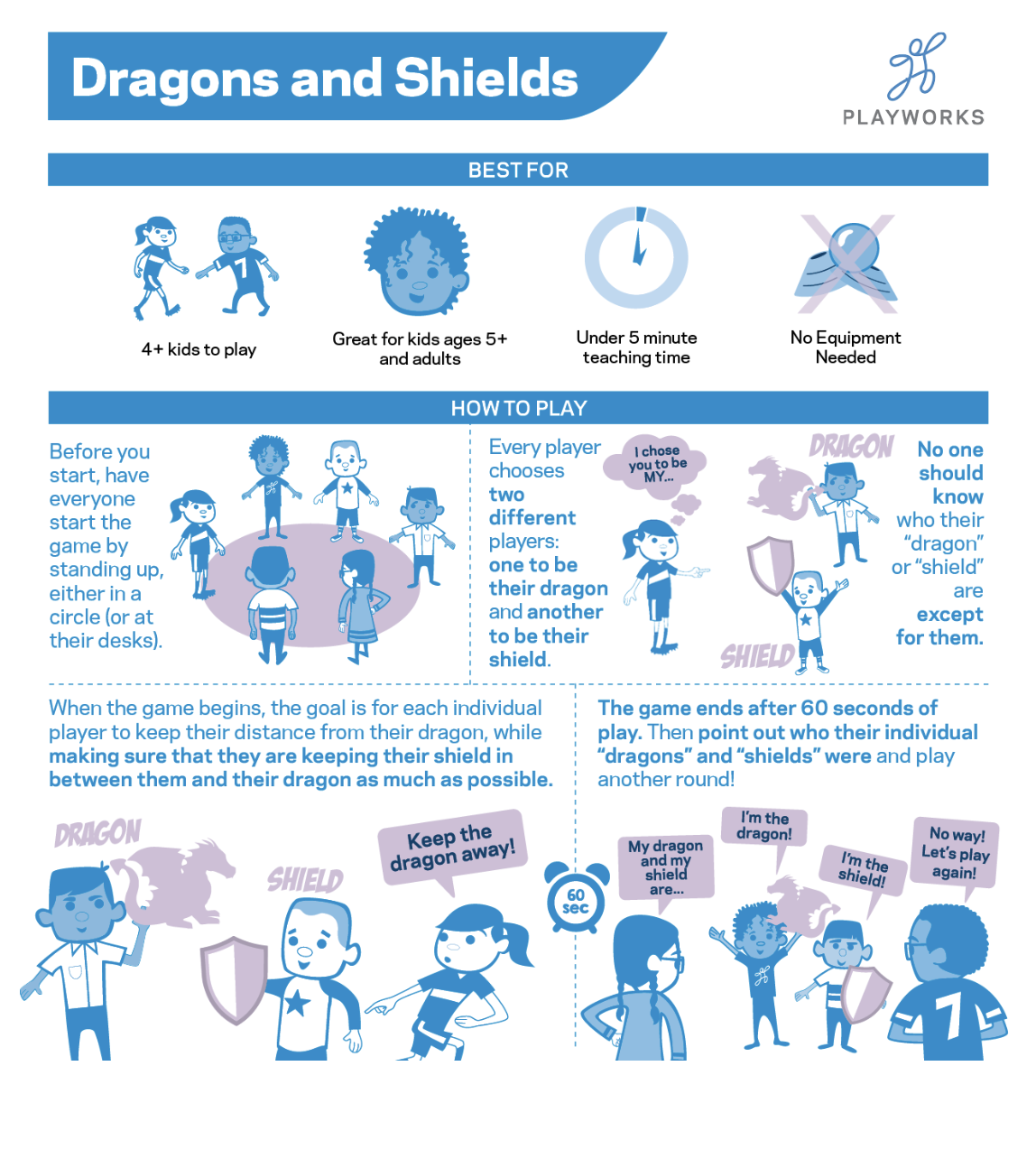
Keep Playing!
Week 38
Empty space, drag to resize
Game of the Week
Empty space, drag to resize
Game of the Week
Invent a Game
This week Playworks is featuring a fun game that allows players the creativity and responsibility to invent their own new game.
Goal: To move carefully and quietly to try and reach the Secret Agent’s special object without getting caught.
Goal: To move carefully and quietly to try and reach the Secret Agent’s special object without getting caught.
Skill Focus
Ethical Responsibility
Recognizing when your actions might have a negative effect on other people or your community and taking steps to make it right.
Empty space, drag to resize
Empty space, drag to resize
People to play:
Empty space, drag to resize
Empty space, drag to resize
Best for ages:
Empty space, drag to resize
Empty space, drag to resize
Setup time:
Empty space, drag to resize
Empty space, drag to resize
Equipment:
Play In-Person
Write your awesome label here.
Play Virtually
Write your awesome label here.
How to Play
-
Before You Start: Gather 6 objects from around the classroom. These items will be used to invent a game.
-
Explain to players that they will be responsible for inventing a new game using some or all of the objects they found in the classroom.
-
Players will be put into groups and work together to find creative ways to use the objects they gathered to invent a game.
-
The Facilitator should put students into groups of 2-6 students for 3 minutes, sharing the instructions to:
Invent a game that has 3-5 fair rules and includes the items collected.Be creative with their materials. -
Students will have the chance to plan more after a full-group check-in. Students will need to return for a second time to the same groups.
-
After 3 minutes, staff should return students to the full group to ask the first set of debrief questions (listed below).
-
Debrief after first breakout session:
What has your group done so far to make sure everyone is included?
Ethical responsibility often means putting your own needs and wants aside to make sure others feel included and valued. What might you do differently in the second breakout to make sure this happens? -
After the first debrief, send students back into the same groups for an additional 3-5 minutes with the following additional instructions:
Work together and make sure every voice is heard.
Step up (if you have not spoken up yet), and step back (if you have already shared ideas to make room for the ideas of others).
All players should be treated fairly during planning and play. -
Bring students back as a full group and ask for breakout groups to teach their games to the rest of the class.Have each group choose one person to present their game to everyone.
Ask the group for feedback and discuss how the group worked together to create the game.
Game Debrief
-
What did your group need to be successful? If you were inventing a game by yourself would the process to create the game be different?
-
In what ways did you act upon doing what was right for the whole community of players in this game?
-
Why is it important to play in a way that benefits and supports the whole group instead of just yourself?
-
When in school can you make sure your actions positively impact others, or the whole group?
Modifications
-
Age Group Modifications
For younger students: Give them a guideline for which type of objects they should find for the game. For example, tell players to find one object that is the color blue, something soft, and something you can write with.
For older students: incorporate more items that they must utilize in the creation of their game. -
Academic ApplicationsIncorporate your current lesson plan. Tell students their game must include a theme from the subject or lesson you choose.
-
Challenge Idea
Change the group size to increase the communication challenge.
Limit the types of objects to increase the creativity challenge.
Brain Break of the Week
Empty space, drag to resize
Brain Break of the Week
Dragons and Shields
This week, Playworks is featuring a Brain Break called Dragons and Shields! Save the free poster to refer to when you need it!
Free Resources
Get the Poster
Empty space, drag to resize

How to Play
-
Before You Start: Have everyone start the game by standing up, either in a circle or at their desks.
-
Before You Start: Explain that everyone will need to look around the circle and choose one person to be their “dragon” and one person to be their “shield”.
-
Before You Start: Explain to the players that no one should know who their “dragon” or “shield” are except for them.
-
When the game begins, the goal is for each individual player to keep their distance from their dragon, while making sure that they are keeping their shield in between them and their dragon as much as possible.
-
The facilitator will give a countdown to conclude the activity.
-
Once finished, give the players an opportunity to reveal who their individual “dragons” and “shields” were!
Announcement of the Week
Empty space, drag to resize
Announcement of the Week
Email Template
Use the template below as you communicate with your team about the Game of the Week, Invent a Game, and how it contributes to building skills such as ethical responsibility.
Free Resources
How to Use it
Simply copy & paste the text below into your email.
Empty space, drag to resize
-
This week, we’ll be wrapping up responsible decision making with a focus on ethical responsibility, which means recognizing when your actions might have a negative effect on other people or your community and taking steps to make it right.
Our game this week has never been played before and is always brand new. Invent a Game challenges students to use all of their responsible decision making skills to work with their group to create something new and fun for everyone to enjoy.
Invent a game together in class, then empower students to teach it and play with others!
Empty space, drag to resize
Write your awesome label here.
Games Library:
Quick Tips
Looking to build skills? We've got you covered.
Find games that support skill development
Select a skill focus from the list below, then copy and paste it into the search bar to see games that develop that skill.
-
Accepting Help
-
Accurate Self Perception
-
Active Listening
-
Analyzing Solutions
-
Building Community
-
Communication
-
Conflict Resolution
-
Cooperation
-
Empathy
-
Ethical Responsibility
-
Growth Mindset
-
Identifying Characteristics
-
Identifying Emotions
-
Identifying Problems
-
Impulse Control
-
Integrity
-
Offering Help
-
Personal Responsibility
-
Perspective Taking
-
Physical Self Awareness
-
Playing Fair
-
Positive Language
-
Problem Solving
-
Relationship Skills
-
Resilience
-
Respect
-
Responsible Decision Making
-
Self Awareness
-
Self Confidence
-
Self Management
-
Self Motivation
-
Social Awareness
-
Social Engagement
-
Stress Management
-
Teamwork
-
Understanding Consequences
-
Using Your Voice
Limited on equipment? No problem!
Find games that require specific equipment
Select an item from the list below, then copy and paste it into the search bar to see games that require that item.
-
Ball
-
Bandana
-
Baseball Bat
-
Base
-
Basketball
-
Beanbag
-
Bouncy Ball
-
Chair
-
Chalk
-
Cone
-
Dodgeball
-
Flag
-
Football
-
Frisbee
-
Hula Hoop
-
Jersey
-
Jump Rope
-
Kickball
-
Soccer Ball
-
Tennis Ball
-
Volleyball
-
Volleyball Net
-
No Equipment Required
Want to find a specific type of game?
Find specific game types
Select a game type from the list below, then copy and paste it into the search bar to see games of that type.
-
Autonomous/Self-Access Game
-
Ball Game
-
Cooperative Game
-
Core Game
-
Icebreaker Game
-
Indoor Game
-
Readiness Game
-
Recess Game
-
Rotational Game
-
Tag Game
Empty space, drag to resize
